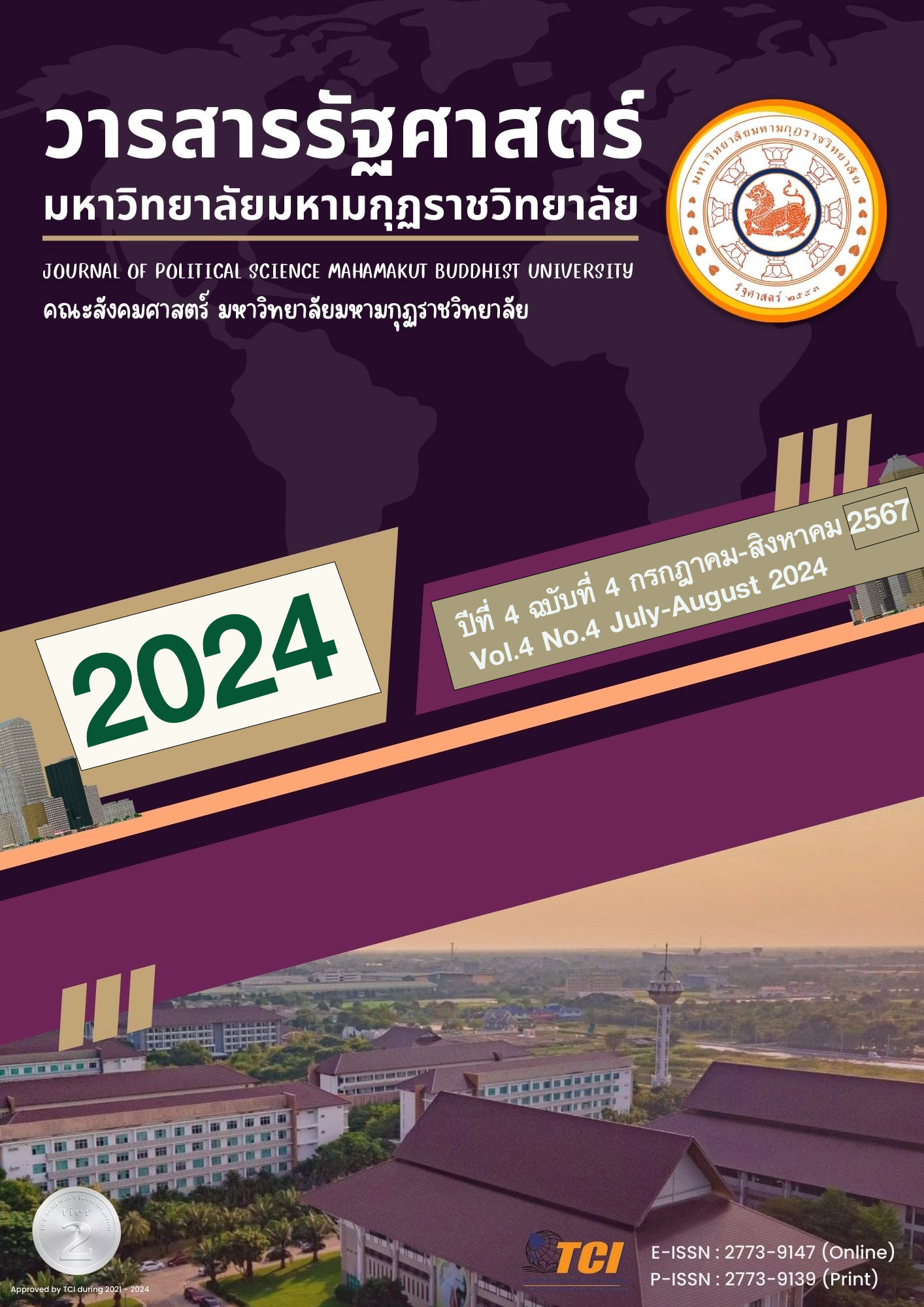ABSOLUTE PLUTOCRACY AND POLITICAL CORRUPTION
Main Article Content
Abstract
Plutocracy refers to govern by the wealthy and includes the relationships of nepotism or favoritism (Paternalism, Nepotism, Favoritism, or Cronyism) arising from marriages between wealthy families or between wealthy families and those with political, administrative, or military power. It is apparent that they hold political power, define political and administrative directions, and use both legal and illegal power, including through elections, forming political parties, and fielding candidates. They provide financial support and support through bureaucratic systems controlled by their allies and relatives.
Absolute Plutocracy thus consists of three components which are wealth, social status, and power, forming a triad of financial, political, and social power. This leads to the acquisition, possession, and exercise of power, perpetuating political power indefinitely. Additionally, when money is involved in government, it inevitably leads to corruption, conflicts of interest, and policy corruption that are closely intertwined and inseparable.
The purpose of this study is to illustrate the relationship between absolute plutocracy and political corruption, and their impact on the development of democracy in Thailand. Additionally, it aims to explore methods for preventing and addressing these both issues at the international level and within Thailand. Document analysis is the primary method used in this study.
The study finds that absolute plutocracy and political corruption have always occurred together, with each acting as both a cause and effect of the other. This is because acquiring political power often requires financial resources, and once in power, there is a necessity to recover that investment. This recovery typically occurs through various forms of corruption, including policy-related corruption, conflicts of interest, and budgetary fraud. Thus, a democratic regime with plutocratic characteristics leads to a loss of legitimacy in government, causing an electoral democracy to inevitably become a Plutocracy.
Political corruption has significant impacts: First, it affects the development of democracy, as corruption is often cited as a primary reason for coups and becomes the most reasonable justification. Second, it impacts national development, especially economic development, as corruption increases inefficiency, leading politicians and civil servants to seek personal gain rather than fulfilling their duties effectively. Third, it affects social and cultural norms, as respect for those with power and wealth becomes the basis for patronage systems and political culture.
There are various approaches to preventing and combating political corruption. This study will compare case studies of approaches in the United States and some European countries, particularly Finland, which has been ranked as one of the most transparent countries globally for several years. For Asia, it will examine Singapore as well as approaches by international organizations such as the United Nations and the World Bank. The study will also consider Thailand, providing comparative insights to help in developing measures to prevent and combat political corruption.
Article Details

This work is licensed under a Creative Commons Attribution-NonCommercial-NoDerivatives 4.0 International License.
References
ฉัตรทิพย์ นาถสุภา. (2522). เศรษฐกิจไทย: โครงสร้างกับการเปลี่ยนแปลง. กรุงเทพมหานคร คณะเศรษฐศาสตร์ จุฬาลงกรณ์มหาวิทยาลัย.
ชัยอนันต์ สมุทวณิช. (2519). ผลของการคอร์รัปชันที่มีต่อการพัฒนาทางเศรษฐกิจและการเมือง. ม.ป.ท.: สถาบันบัณฑิตพัฒนบริหารศาสตร์
ธานินทร์ กรัยวิเชียร. (2510). “กฎหมายกับการฉ้อราษฎร์บังหลวง” อนุสรณ์ในงานพระราชทานเพลิงศพนายไฉน รัตโนดม พระนคร: โรงพิมพ์สำนักนายกรัฐมนตรี
ธีรภัทร์ เสรีรังสรรค์. (2553). นักการเมืองไทย : จริยธรรม ผลประโยชน์ทับซ้อน การคอร์รัปชัน สภาพปัญหา สาเหตุ ผลกระทบ แนวทางแก้ไข. (พิมพ์ครั้งที่ 2). กรุงเทพมหานคร: สำนักพิมพ์สายธาร โรงพิมพ์เดือนตุลา.
นายหนหวย. (2530). เจ้าฟ้าประชาธิปก ราชันผู้นิราศ วิทยานิพนธ์แห่งชีวิต. (พิมพ์ครั้งที่ 3). กรุงเทพมหานคร: ตุลาคม 2530
พรศักดิ์ ผ่องแผ้ว. (2543). ดัชนีคอร์รัปชันของไทย : การสร้างและการตรวจสอบความเชื่อถือได้. กรุงเทพมหานคร: สำนักงาน ป.ป.ช.
ลิขิต ธีรเวคิน. (2554). แนวคิดและวิวัฒนาการทางการเมืองการปกครองไทย : ธนาธิปไตย.(หน่วยที่ 3) ในประมวลสาระชุดวิชา การเมืองการปกครองไทย สาขาวิชารัฐศาสตร์ มหาวิทยาลัยสุโขทัยธรรมาธิราช ฉบับปรับปรุงครั้งที่ 1. (พิมพ์ครั้งที่ 1). นนทบุรี: โรงพิมพ์มหาวิทยาลัยสุโขทัยธรรมาธิราช.
วิทยากร เชียงกูล (2549) แนวทางปราบคอร์รัปชั่นอย่างได้ผล : เปรียบเทียบไทยกับประเทศอื่น. (พิมพ์ครั้งที่ 1). กรุงเทพมหานคร: สำนักพิมพ์สายธาร.
Huntington, Samuel P. (1968). Modernisation and Corruption. in Political Order in Changing Societies. New Haven,Conn: Yale University Press.
Johnson,O.E.G. (1975). An Economic Analysis of Corrup Government. with Special Application to Less Developed Countries. KyKlos, 28(1).
Kaufmann.(2005).Finance and Development, September 2005, 2(3).
Myrdal, Gunnar. (1968). The Folkore of Corruption. The Asian Magazine. 8,(24).


